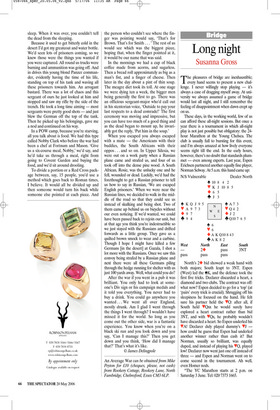Anything but average
James Delingpole
Mike Peyton is the author of the brilliant memoir An Average War — though in truth his war was anything but. In October 1940 he joined his family regiment — 4th battalion, Royal Northumberland Fusiliers — and was overrun and all but wiped out on 6 June 1942 fighting a rearguard action in the Western Desert. He was a POW first in Italy, then Germany, where he witnessed the bombing of Dresden. (‘I thought, “No one but no one should be under that.” Yet another part of me was exulting and saying, “Serves the bastards right.”’) He escaped and spent the last months of his war fighting with the Soviet army. His wife Kathleen is the author of the bestselling Flambards novels.
By the time the Germans overran us we were so tired we really didn’t care. The gunners fired everything they had at the tanks — in the end it was just smoke shells — then a lot of them just went to sleep. When it was over, you couldn’t tell the dead from the sleeping.
Because it used to get bitterly cold in the desert I’d got my greatcoat and water bottle. We’d seen lots of prisoners coming, so we knew those were the things you wanted if you were captured. All round us trucks were burning and ammunition was going off. And in drives this young blond Panzer commander, evidently having the time of his life, standing on top of his tank and waving all these prisoners towards him. An arrogant bastard. There was a lot of chaos and this sergeant of ours he just looked at him and stopped and saw my rifle by the side of the trench. He took a long time aiming — most sergeants were pretty good shots — and just blew the German off the top of the tank. Then he picked up his belongings, gave me a nod and continued on his way.
In a POW camp, because you’re starving, all you talk about is food. We had this type called Nobby Clark who before the war had been a chef at Fortnum and Mason. ‘Give us a six-course meal, Nobby,’ we’d say, and he’d take us through a meal, right from going to Covent Garden and buying the food, and we’d sit around drooling.
To divide a portion or a Red Cross package between, say, 15 people, you’d use a method which goes back to Roman times, I believe. It would all be divided up and then someone would turn his back while someone else pointed at each piece. And the person who couldn’t see where the finger was pointing would say, ‘That’s for Brown. That’s for Smith ... ’ The rest of us would see which was the biggest piece, hoping that, when the finger pointed at it, it would be our name that was said.
In the mornings we had a cup of black coffee made from acorns, and sugarless. Then a bread roll approximately as big as a man’s fist, and a finger of cheese. Then later in the day about a pint of thin soup. The meagre diet took its toll. At one stage we were dying ten a week, the bigger men being generally the first to go. There was an officious sergeant-major who’d call out in his stentorian voice, ‘Outside to pay your last respects to a dead comrade!’ The first ceremony was moving and impressive, but you can have too much of a good thing and as the dead began to mount up, he invariably got the reply, ‘Put him in the soup.’ When you escaped you always escaped with a mate — the Americans with their buddies, the South Africans with their oppos ... and so on. In Upper Silesia, we were out on a work party when a Russian plane came and strafed us, and four of us took off into the dense pine wood. A South African, Rosie, was the unlucky one and he fell, wounded or dead. Luckily, we’d had the forethought to get a Russian prisoner to tell us how to say in Russian, ‘We are escaped English prisoners.’ When we were near the Russian lines, we decided to walk in the middle of the road so that they could see us instead of skulking and being shot. Two of them came up behind us on bicycles without our even noticing. If we’d wanted, we could have been passed back to rejoin our unit, but at that age you think you’re indestructible so we just stayed with the Russians and drifted forwards as a little group. They gave us a quilted brown smock to wear and a carbine. Though I hope I might have killed a few Germans [in the desert] at Gazala, I shot a lot more with the Russians. Once we saw this convoy being strafed by a Russian plane and next there were all these Germans piling through the hedge running for shelter with us just 100 yards away. Well, what could you do?
After the war if you went in a pub it was brilliant. You only had to look at someone’s Div sign or his campaign medals and it told you everything. You never had to buy a drink. You could go anywhere you wanted ... We went all over England, mostly drunk. Am I glad I went through the things I went through? I wouldn’t have missed it for the world. So long as you come out the other side, war is a fantastic experience. You know when you’re on a black ski run and you look down and you say, ‘Can I manage this?’ Then you get down and you think, ‘How did I manage that?’ That’s what it’s like.
© James Delingpole



















































































 Previous page
Previous page